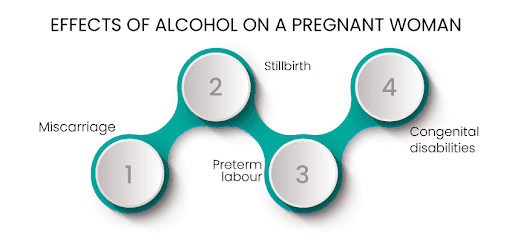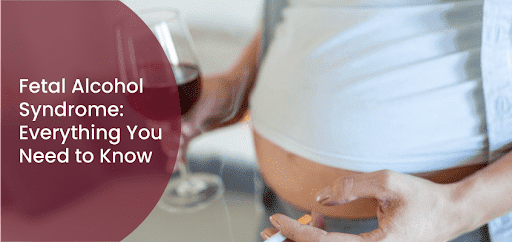Introduction
The importance of making diet and lifestyle changes during pregnancy lies in the fact that these changes can significantly impact the health and development of the fetus. During this critical development period, it is essential to consume a well-balanced diet rich in nutrients and avoid alcohol, caffeine, and other substances that could harm the baby. Consumption of alcohol can lead to fetal alcohol syndrome in babies, which is harmful to their growth and development. Let’s learn more about it below.
Our Wellness Programs
What is fetal alcohol syndrome?
Fetal alcohol syndrome, abbreviated as F.A.S., is a medical condition in the child that results from exposure to alcohol during pregnancy. F.A.S. can cause many physical, mental, and behavioural problems. These problems are often irreversible and may be lifelong. They can affect the child’s development, including growth and physical development, behaviour and mental development, and cognitive functioning.
F.A.S. is the most severe fetal alcohol spectrum disorder. The Diagnosis process is not possible in the womb. The only way to prevent fetal alcohol syndrome is to abstain from alcohol during pregnancy.
Looking for services related to this subject? Get in touch with these experts today!!
Experts

Banani Das Dhar

India
Wellness Expert
Experience: 7 years

Devika Gupta

India
Wellness Expert
Experience: 4 years

Trupti Rakesh valotia

India
Wellness Expert
Experience: 3 years
What are the symptoms of fetal alcohol syndrome?
Symptoms of fetal alcohol syndrome can range from physical defects to intellectual and cognitive deficits and behavioural issues. The severity of the symptoms can vary from mild to severe, depending upon the stage of pregnancy and the extent of alcohol exposure.
Physical Defects of fetal alcohol syndrome:
- The small size of the head and brain
- Vision or hearing difficulties
- Deformities of the joints, limbs, or fingers
- Facial abnormalities include small eyes, a fragile upper lip, a ridge between the upper lip and nose
- Lower-than-average height and weight and developmental delays
- Problems with kidneys, heart, or bones
Brain and Central Nervous System Abnormalities of fetal alcohol syndrome:
- Learning disabilities and low intellect
- Poor memory
- Coordination and balance issues
- Trouble concentrating
- Hyperactivity
- Poor judgement skills
- Fluctuating moods
Behavioural issues of fetal alcohol syndrome:
- Poor social skills
- Difficulty getting along with others
- Difficulty adapting to change
- Impulsive behaviour
- Poor time management
- Problem staying and focusing on a task
- Difficulty planning and working towards a goal
When should you seek medical help for Fetal alcohol syndrome?
If you are concerned that your child has fetal alcohol syndrome, the first step is to talk to your child’s doctor. It is essential to seek medical attention as soon as possible. There is no cure for F.A.S., but early diagnosis and treatment can help reduce symptoms and improve the child’s quality of life.
Your doctor can perform a physical exam and order tests to look for signs of F.A.S. They may also ask about your alcohol consumption during pregnancy and whether you have any family history of F.A.S. or other conditions that can cause similar symptoms. F.A.S. is a severe condition that can cause lifelong problems, so it is vital to get an accurate diagnosis and start treatment immediately.
Once your doctor has diagnosed your child with F.A.S., they will typically refer you to a specialist for further treatment and support. Depending on your child’s specific symptoms, this may include counselling, special education services in school, or physical and occupational therapy.
Your doctor may also recommend medications to help manage any associated mental health or developmental issues. The counselling of parents also plays a crucial role in understanding how the condition affects the child and learning strategies for helping the child cope with their disabilities.
Some main reasons for Fetal alcohol syndrome. Can alcohol be consumed in moderation during pregnancy?
The answer is NO. There is no safe period during pregnancy for alcohol consumption.
Main reasons for Fetal alcohol syndrome
- Any kind of alcohol, beer, wine, or liquor, is harmful in pregnancy. It would help if you abstained from alcohol even when you are trying to conceive because the fetal organs start developing even before you might become aware that you are pregnant.
- When the mother drinks alcohol, it crosses the placenta and enters the baby’s system. Due to the not correctly developing of the baby’s liver, it cannot metabolise alcohol quickly. Thus, it accumulates in higher concentrations in the baby’s body and adversely affects the growth and development of the tissues and organs.
- Alcohol is known to have a deteriorating effect on the brain cells and can result in permanent brain damage to the baby. Alcohol also interferes with optimal oxygen supply and nutrition in the developing fetus.
Effects of alcohol on a pregnant woman

Alcohol consumption by a pregnant woman can result in:
- Miscarriage
- Stillbirth
- Preterm labour
- Fetal alcohol syndrome or other kinds of congenital disabilities
Some of your friends may believe an occasional celebratory glass of wine should not cause any problems. Most doctors believe that a maximum of two drinks per week might be safe for consumption, but there is no evidence about how much alcohol a pregnant woman should drink during pregnancy. Hence, it is advisable to abstain from alcohol altogether while pregnant.
Conclusion
If you have conceived, consider it a blessing, as many cannot! Now, it’s your responsibility to take utmost care of the baby and beware of any actions that might cause harm to its health and well-being, including avoiding alcohol during pregnancy. It might, after all, not be a great sacrifice for bringing a healthy and beautiful life into this world!
If you struggle with quitting alcohol and cannot stop drinking, do not hesitate to seek help from your family, friends, and doctor. Many available resources help you quit drinking, such as Alcohol Anonymous. You must take this step to save your current and future pregnancies.
Remember that severe congenital disabilities, such as those caused by fetal alcohol syndrome, are irreversible and incurable but are easily preventable by not exposing your baby to alcohol before birth. That is possible only if you abstain from alcohol at all stages of pregnancy.
Visit unitedwecare.com for more insightful reads!

















